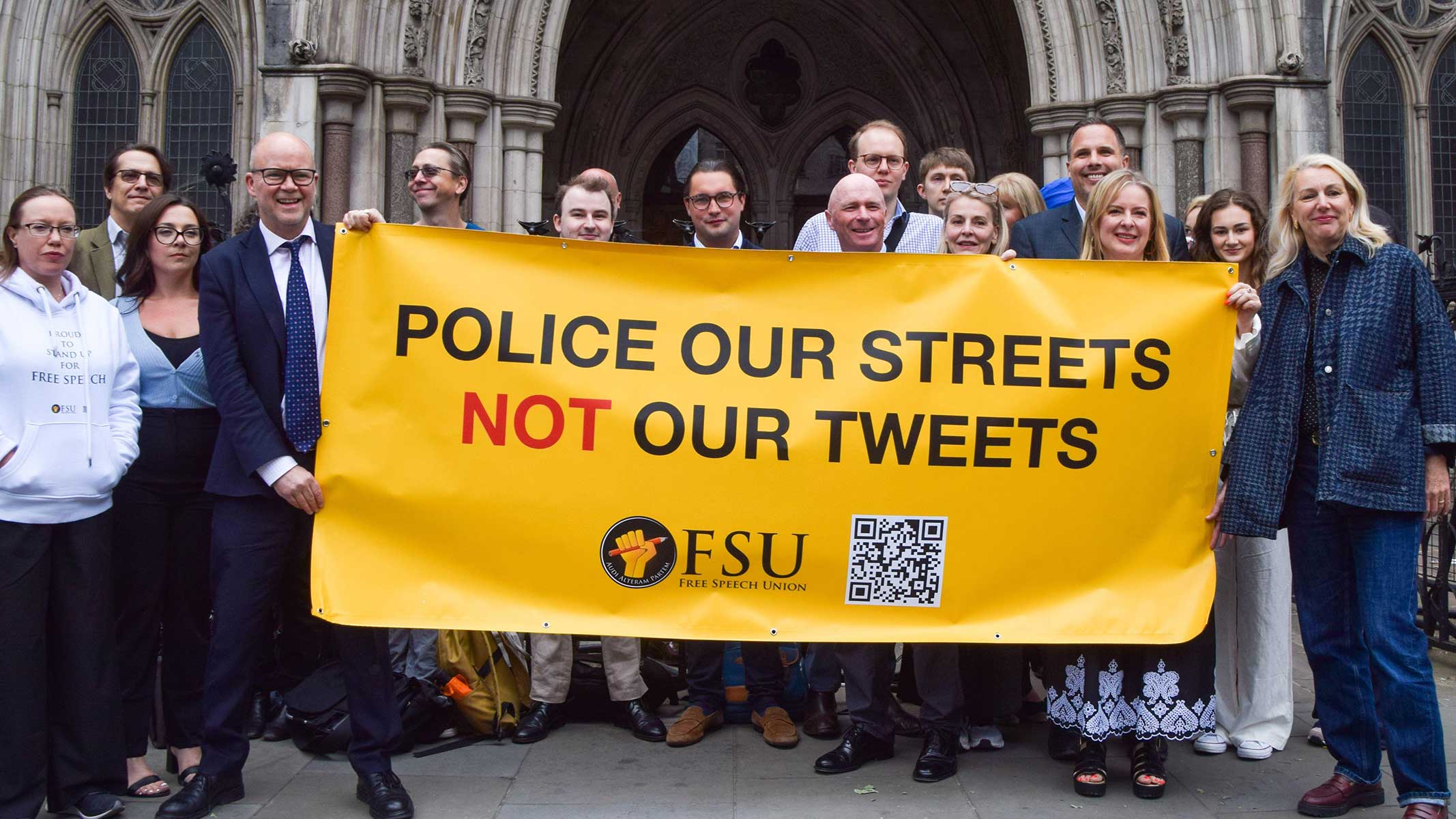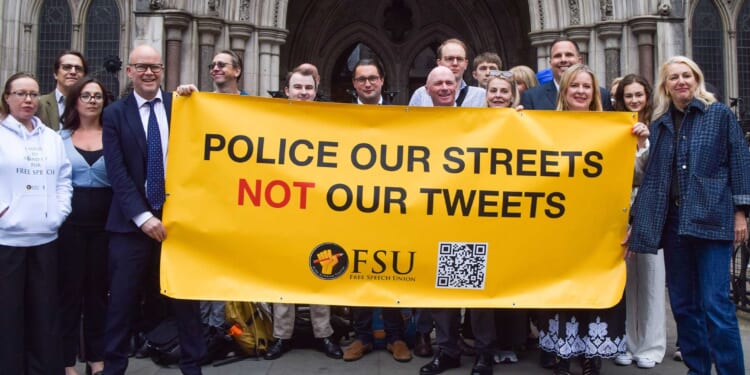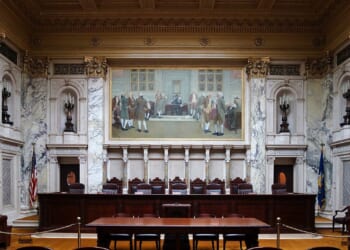
It is only appropriate that the head of Britain’s government should be Keir Starmer, a human rights lawyer and former head of the nation’s prosecuting authorities, because Britain now prosecutes its own citizens—if they say the wrong things. The ideology and culture of human rights, whether by design or not, have served to make the country safer for criminals, increase mass illegal immigration, curtail freedom of speech, and entrench a sprawling ideological bureaucracy.
To be fair, Starmer has merely continued a long-standing British cultural and legal trend of curtailing individual freedoms; not even his fiercest critics would credit him with originality. His predecessors had hardly distinguished themselves in defending free speech, which has been under sustained attack for years.
Finally, a reason to check your email.
Sign up for our free newsletter today.
Curiously enough, one of the great founding texts of Western liberalism, John Stuart Mill’s On Liberty, could be twisted by the enemies of freedom to justify its opposite. Mill wrote:
The object of this Essay is to assert one very simple principle, as entitled to govern absolutely the dealings of society with the individual in the way of compulsion and control, whether the means used be physical force in the form of legal penalties, or the moral coercion of public opinion. That principle is, that the sole end for which mankind are warranted, individually or collectively, in interfering with the liberty of action of any of their number, is self-protection. That the only purpose for which power can be rightfully exercised over any member of a civilized community, against his will, is to prevent harm to others.
The prevention of harm to others: here was the open sesame, the locus standi, for unlimited interference in others’ lives, for what constituted harm could be indefinitely extended. When he wrote, Mill probably had in mind a vigorous Victorian view of harm; but with the ever-expanding list of possible harms and causes of harm, partly discovered and partly invented, people developed eggshell sensibilities: they could claim injury from ever less.
Words themselves became instruments of injury: gone are the days when children on the playground might taunt one another, “Sticks and stones may break my bones, but words will never hurt me.” Now words are treated as indistinguishable from sticks and stones, a broken heart no different from a broken leg. Legal doctrine today holds that psychiatric harm must be treated in the same manner by the courts as physical harm; and since, given the looseness of psychiatric diagnosis, the former is far easier to fake than the latter, the result has been to undermine honesty in parts of the population and to fuel a vast increase in paid abstention from work, to the great detriment of public finances.
The man on the Clapham omnibus—the notional, law-abiding citizen of average robust disposition and ability to reason—has died or been killed off. In his place stands a person of immense vulnerability. In employment tribunals, for instance, bullying is defined as whatever the supposed victim considers bullying. No objective standard is required for the accusation to be upheld: it is thus difficult for any organization to defend itself against such a charge, and it must therefore treat its employees as if they were in permanent rehabilitation from that debilitating disease known as life.
A turning point in the treatment of racism in Britain came with the Macpherson Report, a public inquiry into the murder in 1993 of a young black man at a bus stop by five white thugs, who set upon him unprovoked. The men were acquitted, owing to inadequate police evidence, prompting an outcry and the establishment of the inquiry, whose deliberations were often conducted under intimidation—intellectual and physical alike—by those in the audience. Though a distinguished judge chaired the panel, the resulting report was marked by exceptional moral and intellectual sloppiness. Finding no actual evidence that the police failures were due to their racism—rather than, say, their incompetence (hardly unknown to the public), or even corruption (some of the thugs came from families tied to organized crime)—the report fell back on the lazy, catchall notion of institutional racism, according to which organizations and their employees are racist ex officio, without anyone needing to act, or even speak, in a racist manner, rendering defense against the charge impossible.
Worse still, the report’s 1999 recommendations declared: “A racist incident is any incident which is perceived to be racist by the victim or any other person.” Thus, the nature of an incident could be determined unquestioningly by any passing psychotic or enragé—who, inevitably, would become more numerous, since the definition itself encouraged and rewarded them, if the satisfaction of malice may be counted as a reward (as I think it can).
But even this was not all. The recommendations of the report continued: “[T]he term ‘racist incident’ must be understood to include crimes and non-crimes in policing terms. Both must be reported, recorded and investigated with equal commitment.” Who on reading this can fail to think of Kafka’s The Trial? “Someone must have been telling lies about Joseph K., for one fine morning, without having done anything wrong, he was arrested.”
The police henceforth had the right—indeed, the duty—to concern themselves with what citizens said or did, irrespective of its criminality. The recommendations continued: “[T]his definition should be universally adopted by the Police, local Government and other relevant agencies.”
The report and its recommendations were almost unanimously applauded by the intellectual and bureaucratic classes; even now, over a quarter century later, it is still cited as a kind of moral authority, despite its obvious and even gross shortcomings. Among other consequences, the report led to the abandonment of the age-old prohibition on double jeopardy. The five assailants were retried and convicted, and the adage that hard cases make bad law was inverted: here, a hard case made supposedly good law, all in the name of a social desideratum, the elimination of racism.
The Macpherson Report revived the principle of the Star Chamber, where denial of a charge could, if convenient, be taken as proof of guilt. One could either plead guilty and be found guilty or plead innocent and be found guilty—the second being the worse alternative, as it implied failure to admit wrongdoing and therefore suggested the likelihood of recidivism.
All this was nectar to two classes of person: officialdom and the promoters of the identitarian politics of victimization. The Macpherson Report was both a manifestation and a cause of society’s increasing balkanization, such that all that held it together was geographical proximity and what divided it were clans defining themselves by the victimization that they claimed to suffer, in the present but especially in the past.
This proved extremely useful to a thoroughly bureaucratized police force, which could now spend its time shadowboxing with abstract intellectual chimeras rather than pursuing flesh-and-blood criminals. It was an approach that simultaneously created work and prevented it, or, at any rate, excused it from being done. Fighting a chimera is time-consuming and unceasing but safe, unlike confronting real criminals. Who would not prefer investigating computer messages from the comfort of an office to chasing violent young men armed with machetes, knives, or even guns? And of course, the “local government and other relevant agencies” cited in the report, already employing millions, seized the chance to expand both their staffs and their powers over ordinary citizens, while neglecting the tasks that people actually wanted done, such as repairing roads and collecting household trash.
The requirement to investigate every allegation as serious had two effects. First, it fostered self-censorship and mistrust within organizations, since even the most anodyne or innocent remark could be taken by someone who overheard it as racist; and second, it expanded the power of the administration of any organization, which became a kind of Star Chamber in itself, capable of terrorizing institutional inferiors. As in any totalitarian society, the Star Chamber also lived in fear, for any member could be accused at any moment, by anyone, and its power was thus exercised under constant dread. At a lunch that I once attended with a prominent human rights lawyer, I remarked that one of her arguments was racist. I did not for a moment believe that she was racist; I intended only to turn her unanswerable accusations against herself. Never shall I forget the look of shock and terror on her face, in case I should be sufficiently adroit to offer a plausible substantiation and because she knew that there was no defense against the charge if I did.
Unsurprisingly, the model that the Macpherson Report set out for racism was adopted by other identitarian groups claiming special status, including protection from criticism, however reasonable or moderate. They quickly grasped that criticism can be said to cause distress; distress can be leveraged into psychiatric illness; and harm, or supposed harm, can be made the pretext of administrative and legal privileges. This was particularly useful to Muslims, whose religion has never welcomed criticism of its founder or its principles, and whose leaders, by creating the concept of “Islamophobia,” were able to suggest that such criticism was both deeply harmful and tantamount to quasi-fascism.
In 2010, a supposedly conservative British government passed an Equality Act that created “protected characteristics.” In the name of equality, it thus abolished equality before the law. It became illegal to “discriminate” against people based on disability, sex or gender reassignment, sexual orientation, religion, race, nationality or national origin, or belief. Much of the population was thus treated as if it were an endangered species, or in need of Indian reservations of the mind.
An official government document explains that “discrimination’’ means treating persons with a protected characteristic less favorably than persons without one (if such a person can even be found), making rules that disadvantage them, harassing them by creating an environment offensive to them, or victimizing them for complaining of victimization. There is even what might be called meta-discrimination: you can claim discrimination if you are associated with someone with a “protected characteristic.” The document further assures such individuals that they may suffer discrimination at work, in education, as consumers, when using public services, when buying or renting property, or as members or guests of clubs and private associations—in short, in almost any sphere of life outside the home. This is hardly a recipe for psychological resilience or for the free exchange of opinion.
You didn’t need to be Nostradamus to predict the crushing effect of such legislation on freedom, and even on efficiency, in exchange for supposed advantages to groups encouraged to see themselves as victims or potential victims: again, most of the population. Appointments to positions, or dismissal from them, became matters of delicacy and danger, especially in areas where the population had become diverse: anybody with a “protected characteristic” could claim that he had not been appointed, or had been dismissed, because of that characteristic. The avoidance of the charge of discrimination became far more important than the choice of the best person to do the job. The entire country came to live under an atmosphere of permanent fear and moral blackmail.
This was all made worse by the official promotion of denunciation as a method of social control. I still recall my shock in the late 1990s when I first saw a poster reading “Rat on a rat.” It showed a nasty-looking rat and listed a phone number that people could call anonymously to denounce anyone they suspected of claiming social security while working at the same time. In effect, the government had created a system that encouraged widespread fraud, did nothing to prevent it, and then wanted members of the public to denounce one another—not to end the fraud, which the government repeatedly showed no interest in ending, but to atomize society, sow mistrust, and make people ever more dependent on the benevolent shepherds of the public administration, and thus on the state itself.
The combination of frightening and bullying the population, while ignoring actual disorder, has become the hallmark of British public administration. Notices are posted at stations, airports, hospitals, post offices, and on trains and buses warning of what will not be tolerated, especially so-called hate crimes. At the same time, public-address systems endlessly urge people to call the police “if you see something that doesn’t look right,” without specifying what that might be, implying that the population is constantly under threat requiring police protection—which they know from experience to be almost notional, with the vast majority of crimes neither investigated nor even recorded, let alone prosecuted. We live increasingly in a state whose actions veer between the ineffectual and the malign.
A recent incident on a train brought this home to me: the impotent fear of real disorder in which the public lives. It was a journey of nearly two hours, and I was seated in the quiet coach, where passengers are expected to remain mostly silent and refrain from using mobile phones or other noisy devices. Yet a man in his mid-twenties, dressed in the uniform of the modern underclass, blasted some appalling rap music at full volume from a device. For a long time, no one dared say anything to him: he looked the type who might be carrying a knife.
Eventually, I approached him to ask him to turn his “music” off. He immediately became angry. He might well have been under the influence of drugs. “I’ve just been diagnosed with autism and ADHD,” he said. “My music calms me down.” The idea of rap music calming anyone down had at least the merit of originality.
“I am sorry for you,” I said. “Nevertheless,” I insisted, “this is the quiet coach.” He asked me whether I wanted him to become violent, and he looked as if he might do so. None of the other passengers supported me—they were too frightened. (Meantime, “If you see something that doesn’t look right” played once more over the public-address system.)
In the end, swearing aggressively, he turned his music off, but he telephoned a friend and loudly told him that someone on the train was provoking him and wanted him to become violent. At the train’s destination, I saw him lope off in an agitated way, likely to cause a problem somewhere else.
This small episode is revealing in several ways. The young man, though clearly not well educated and perhaps not very intelligent, had absorbed the idea that a psychiatric diagnosis (of doubtful validity) entitled him to behave in an antisocial way, without interference, because he was a victim. It also illustrated how a single such person can easily prevail over a score or more of people behaving normally, since everyone is frightened of the violence that is now prevalent in society and because they recognize that, if the man had attacked me and I had sought to defend myself, the law might well have treated us as if we were equally guilty parties, or perhaps even that I was the instigator.
Finally, if I had called the police, they probably would have behaved like uniformed and only mildly menacing psychiatric nurses—sympathizing with the young man rather than insisting, under threat of arrest, on decent behavior. After all, he probably came from a bad family, was uneducated, unemployed, impoverished, ill, and afflicted with that brain disease known as addiction. Only the exceptionally hard-hearted would think to demand anything of him.
Nietzsche’s transvaluation of values has been all but achieved: the criminal is now the victim, and the victim the criminal. It is hardly surprising, then, that under such conditions, freedom of speech in Britain is fast becoming freedom from speech, especially where those with “protected characteristics” claim that words have harmed them.
The case of Lucy Connolly is likewise instructive. With no prior convictions, she was sentenced under current legislation to 31 months in prison for posting a nasty tweet—removed three hours later—calling for mass deportation of illegal immigrants (often mistakenly called asylum seekers) and saying that she would not mind if people set fire to hotels housing them. (One should note that sentences in Britain have for years been automatically reduced by remission, another example of the state’s Orwellian inability, or unwillingness, to say what it means or mean what it says.) The comment was posted in a context of threatened or actual violence, but it is hard to believe that anyone would have altered his behavior because of it.
When the Court of Appeal refused to reduce her sentence, Connolly’s Member of Parliament, Mike Reader, said that while he had sympathy for her, “I want the police to protect us online and I want the police to protect us on the streets, and they should be doing it equally.” He added that it was a fallacy and a “misunderstanding of the world” to think that the online realm is not “as dangerous for people as the streets,” since “we’re all influenced by what we see.”
Reader is a member of the governing Labour Party, and by no means one of its extremists. His view is mainstream, and he seems not to see, or perhaps to care, that it is a recipe for totalitarian tyranny. At best, he is giving the police carte blanche to do little about the actual disorder on the streets because they are spending half their time trawling the Internet for crimes of opinion.
The government that he supports has reportedly released 26,000 prisoners early in the first few months of its mandate, including many long-term offenders. Those sentenced to 14 years, almost by definition for serious violent crimes, will henceforth serve only five and a half years: only a little more than twice as long as Lucy Connolly received for a single tweet.
That the case of Connolly was no aberration but a sign of authoritarianism to come is proved by the arrest of scriptwriter Graham Linehan, at Heathrow Airport as he stepped off a plane, for alleged offenses such as tweeting that an aerial photograph of some demonstrators was a photo that smelled. It took five policemen to arrest this dangerous criminal.
By their priorities shall ye know them.
Photo: Supporters of Lucy Connolly, who was jailed for 31 months for provocative postings on X (© Vuk Valcic/ZUMA Press Wire/Alamy Stock Photo)
Source link

















